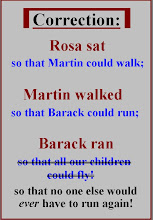 | | Today, good men everywhere must stand with Arizona. Go here. |
|
Some time ago, I met a man who calls himself "Mr. Wells." He claims to be from the past and to have traveled to the future. On his most recent return therefrom, he brought with him a book, the copyright of which indicates that it was (will be) published in the year 2032 — which is to say, two decades and two years hence. When I expressed surprise that books would still exist as print on paper in that future time, Mr. Wells replied that antiquities had (will) become all the rage, and with some rather startling results. Passenger trains, resurrections of
The Twentieth Century and the
Super Chief, would once again link New York and Los Angeles, affording their riders incomparable passage and a three day vacation. Of course, there would be teleporters aboard, just in case someone needed to get somewhere in a hurry.
Mr. Wells' book is called The Second War Between the States, and the preface is (will be) written by the retired first President of of the Reconstituted United States of America (RUSA). In part, she writes as follows:
|  | | The "New South." |
|
"As everyone knows, the opening shots were fired by federalized guardsmen at citizens protesting the contested election of 2012. What followed were more protests, work stoppages, mass arrests and finally secession of the twenty-seven states that inaccurately came to be called the "New South." Five years of intermittent negotiation and sporadic conflict, from which the the armed forces remained blessedly aloof, ensued. Eventually, things got sorted out at the Second Constitutional Convention that restored the republic to something that the Framers might possibly have recognized and of which, I'd like to believe, they would have approved.
"Commentators say it was the attack on unarmed demonstrators that stirred the nation into rebellion. But, in a real sense, the fuse was lit two years previous when the governor of Arizona signed into law two measures passed by her state's 'take no prisoners' legislature. The first (SB 1070) allowed police officers to determine the immigration status of individuals suspected of other crimes; the second (HB 2281) proscribed the teaching of classes advocating 'ethnic solidarity instead of the treatment of pupils as individuals.' Ironically, neither law would have had much effect on the problem it addressed. Even had it survived the inevitable court challenges, SB 1070 would have done little to curb illegal immigration. Nor would HB 2281 have given pause to the multiculturalists who controlled the state's schools. But the Left overplayed its hand. They unleashed a firestorm of acrimony and invective, organized boycotts and generally sought to ostracize the decent folk of Arizona from the body politic. In response, those stubborn Arizona patriots promulgated a third law (SB 1024) requiring Presidential candidates to prove that they meet 'the residency requirements for President of the United States as prescribed in Article II, Section 1 of the Constitution.'
"Another firestorm of leftist outrage ensued. The legislators were reviled as "birthers," racists, the equivalent of Holocaust deniers, and so forth. Of course, producing a birth certificate is something most of us have had to do at one time or another. But, as everyone knows, one candidate refused to do this, even while claiming that he had already done so. His name did not appear on the state ballot and the subsequently organized write-in campaign failed. Arizona's electoral votes went to an Independent; and the election, to the House of Representatives. When the House deadlocked, there followed the infamous "Gadsden Purchase" email, the attempt to shut down social networking sites, the march on Washington and the Massacre on the Mall.
"Professor Smith, author of the present volume and a distinguished historian with more than twenty books to his credit, reviews these events with his usual thoroughness and attention to detail. Especially riveting is his account of the attempt to bribe the Arizona congressional delegation, the origins of the plot and how it would almost surely have succeeded but for the courage of two junior staffers who ultimately paid with their lives.
"Professor Smith argues that America's Second Civil War was the inevitable result of a clash of world views — espoused, on the one hand, by secular, communitarian intellectuals and, on the other, by heirs to the yeoman farmer, Judeo-Christian tradition upon which the nation had been founded. The former's role in the purposeful creation of a permanent underclass as a device for growing government and enhancing their own authority is laid out with chilling clarity; likewise, the latter's almost-too-late rediscovery of the fact that liberty and self-reliance are inseparable.
"Of course, Professor Smith's conclusions will not be the final word. Future historians may, almost certainly will, proffer alternative views. But the important point is that a nation that forgets its history is a nation in danger of losing its soul. Let us remember that fact, and let us reflect — RM."
Whether or not the man who calls himself Mr. Wells and the historical Mr. Wells, the novelist and historian, are one and the same, I do not know. Nor can I say if revealing what he says is to come will change what does. What I do know is that today good men everywhere must stand with Arizona. As for tomorrow, she awaits, as always, obscured by an impenetrable veil.















No comments:
Post a Comment